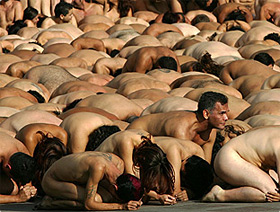It's almost as bad as counting the number of times those who promote the 'hoax hypothesis' deliberately the word 'climax' in the description of LGM 1 (= the first addition to the longer gospel of Mark) in order to convince the ignorant reader that the text reads like a Marquis de Sade letter. Isn't this the kind of thing we did back in high school? It's tantamount to the giggles that 'Leave it to Beaver' must have got among prepubescent intellectual heavyweights when they realized the possible double entendre.
In any event here are the only two times that Morton Smith brings up the possibility that the text might be related to ancient homosexuality:
- (p. 154) ἴδε πῶς ἐφίλει αὐτό is intended to show how the Jews twisted Jesus's innocent sorrow into evidence for a charge of homosexuality ...
- At this point Clement tells Theodore, τὸ δε γυμνὸς γυμνῷ και ταλλα περι ων εγραψας ουκ ευρισκεται; in other words, the longer text as used in Clement's church (or, as Clement chose to describe it) did not contain some material - including the phrase γυμνὸς γυμνῷ - which Theodore had reported as standing hereabouts in the Carpocratian text. Since the Carpocratians had a reputation for sexual license (see Appendix B) and this section of the longer text reported that a youth came to Jesus περιβεβλημενος σινδονα επι γυμνου and stayed with him all night, it is easy to suppose that the Carpocratians took the opportunity to insert in the text some material which would authorize homosexual relationship Clement suggested by picking out γυμνὸς γυμνῷ. Similar developments might be thought to lie behind the celebration of baptism in Acta Thomae 27 ... and sayings like Gospel of Thomas (Leopoldt) 108, "Jesus said, 'He who will drink of my mouth will become like me, and I shall be he, and the hidden things shall be revealed to him" ... However Clement does not explicitly say that the additional material was sexually offensive, and would hardly have missed the chance to say so if it had been. Therefore the γυμνὸς γυμνῷ probably belonged to a fuller account of the ritual. Hippolytus, Apostolic Tradition XXI.11, after speaking of the catechumen and the presbyter who is to baptize him, goes on to specify, "And let him stand in the water naked" ...
This is it folks - this is the extent to which Morton Smith 'promoted' his discovery as 'proving' that Jesus was gay or having 'gay sex' with his disciple. If most people acknowledge that the current 'birth certificate' conspiracy associated with President Obama is ridiculous, how can anyone believe that Morton Smith developed a 'fake text' like the Letter to Theodore in order to promote homosexuality in the churches?
Seriously, it takes a warped mind to actually read the only two references to 'homosexuality' in his 1973 book and then say 'Ah yes, he still forged the letter as a kind of Trojan horse, leaving it to future generations to 'discover' the gay references. As we have noted many times here γυμνὸς γυμνῷ is actually a reference to Maximus of Tyre's very famous Dissertation 41 and its reference to 'naked with naked' - i.e. naked soul being judged by naked son of God in the Platonic judgement of the dead (from Plato's Gorgias 523d). Even though Smith never unraveled the reference it is plain that he actually seems to have rejected the homosexual explanation of the text.
How diabolically clever of this master forger!!!
























































